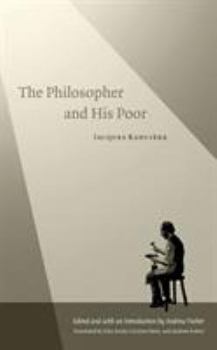The Philosopher and His Poor
Select Format
Select Condition 
Book Overview
Jacques Ranci re's The Philosopher and His Poor meditates on these questions in close readings of major texts of Western thought in which the poor have played a leading role--sometimes as the objects of philosophical analysis, sometimes as illustrations of philosophical argument. Published in France in 1983 and made available here for the first time in English, this consummate study assesses the consequences for Marx, Sartre, and Bourdieu of Plato's admonition that workers should do "nothing else" than their own work. It offers innovative readings of these thinkers' struggles to elaborate a philosophy of the poor. Presenting a left critique of Bourdieu, the terms of which are largely unknown to an English-language readership, The Philosopher and His Poor remains remarkably timely twenty years after its initial publication.





